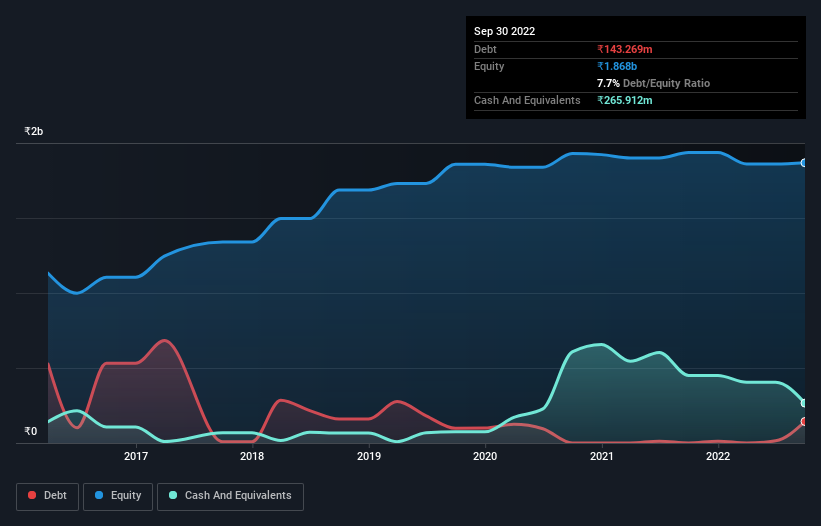
Howard Marks put it nicely when he said that, rather than worrying about share price volatility, 'The possibility of permanent loss is the risk I worry about... and every practical investor I know worries about.' So it might be obvious that you need to consider debt, when you think about how risky any given stock is, because too much debt can sink a company. Importantly, The Waterbase Limited (NSE:WATERBASE) does carry debt. But the more important question is: how much risk is that debt creating?
When Is Debt A Problem?
Debt is a tool to help businesses grow, but if a business is incapable of paying off its lenders, then it exists at their mercy. Part and parcel of capitalism is the process of 'creative destruction' where failed businesses are mercilessly liquidated by their bankers. However, a more common (but still painful) scenario is that it has to raise new equity capital at a low price, thus permanently diluting shareholders. By replacing dilution, though, debt can be an extremely good tool for businesses that need capital to invest in growth at high rates of return. The first step when considering a company's debt levels is to consider its cash and debt together.
View our latest analysis for Waterbase
What Is Waterbase's Debt?
You can click the graphic below for the historical numbers, but it shows that as of September 2022 Waterbase had ₹143.3m of debt, an increase on none, over one year. However, it does have ₹265.9m in cash offsetting this, leading to net cash of ₹122.6m.

How Healthy Is Waterbase's Balance Sheet?
According to the last reported balance sheet, Waterbase had liabilities of ₹721.1m due within 12 months, and liabilities of ₹34.8m due beyond 12 months. Offsetting this, it had ₹265.9m in cash and ₹985.0m in receivables that were due within 12 months. So it actually has ₹495.1m more liquid assets than total liabilities.
This short term liquidity is a sign that Waterbase could probably pay off its debt with ease, as its balance sheet is far from stretched. Succinctly put, Waterbase boasts net cash, so it's fair to say it does not have a heavy debt load! The balance sheet is clearly the area to focus on when you are analysing debt. But you can't view debt in total isolation; since Waterbase will need earnings to service that debt. So when considering debt, it's definitely worth looking at the earnings trend. Click here for an interactive snapshot.
Over 12 months, Waterbase made a loss at the EBIT level, and saw its revenue drop to ₹2.6b, which is a fall of 6.0%. That's not what we would hope to see.
So How Risky Is Waterbase?
By their very nature companies that are losing money are more risky than those with a long history of profitability. And in the last year Waterbase had an earnings before interest and tax (EBIT) loss, truth be told. Indeed, in that time it burnt through ₹287m of cash and made a loss of ₹69m. With only ₹122.6m on the balance sheet, it would appear that its going to need to raise capital again soon. Overall, its balance sheet doesn't seem overly risky, at the moment, but we're always cautious until we see the positive free cash flow. When analysing debt levels, the balance sheet is the obvious place to start. But ultimately, every company can contain risks that exist outside of the balance sheet. Case in point: We've spotted 2 warning signs for Waterbase you should be aware of, and 1 of them is potentially serious.
When all is said and done, sometimes its easier to focus on companies that don't even need debt. Readers can access a list of growth stocks with zero net debt 100% free, right now.
If you're looking to trade Waterbase, open an account with the lowest-cost platform trusted by professionals, Interactive Brokers.
With clients in over 200 countries and territories, and access to 160 markets, IBKR lets you trade stocks, options, futures, forex, bonds and funds from a single integrated account.
Enjoy no hidden fees, no account minimums, and FX conversion rates as low as 0.03%, far better than what most brokers offer.
Sponsored ContentValuation is complex, but we're here to simplify it.
Discover if Waterbase might be undervalued or overvalued with our detailed analysis, featuring fair value estimates, potential risks, dividends, insider trades, and its financial condition.
Access Free AnalysisHave feedback on this article? Concerned about the content? Get in touch with us directly. Alternatively, email editorial-team (at) simplywallst.com.
This article by Simply Wall St is general in nature. We provide commentary based on historical data and analyst forecasts only using an unbiased methodology and our articles are not intended to be financial advice. It does not constitute a recommendation to buy or sell any stock, and does not take account of your objectives, or your financial situation. We aim to bring you long-term focused analysis driven by fundamental data. Note that our analysis may not factor in the latest price-sensitive company announcements or qualitative material. Simply Wall St has no position in any stocks mentioned.
About NSEI:WATERBASE
Waterbase
Operates as an aquaculture company in India and internationally.
Mediocre balance sheet and overvalued.
Similar Companies
Market Insights
Community Narratives



